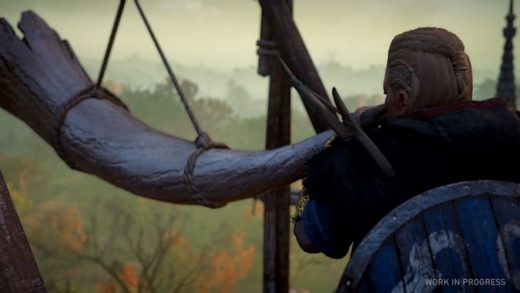Assassin’s Creed could become an online service game
Assassin’s Creed Valhalla made me want to visit East Anglia
Perhaps the series’ greatest accomplishment.

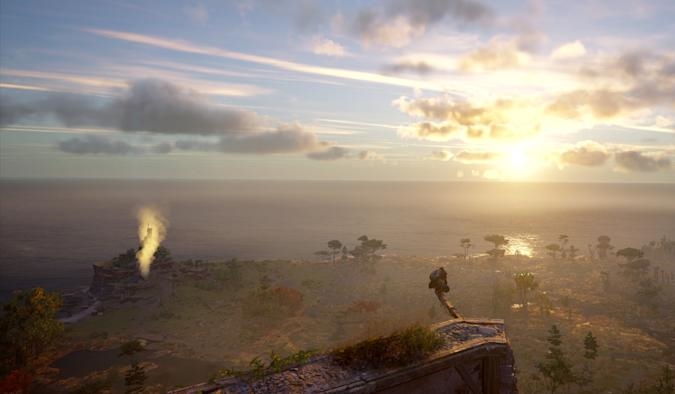
It’s hard to get a feel for a game in a couple of hours. It’s even harder when your screen is filled with streaming artifacts, but such is life in 2020. Ahead of Ubisoft’s Forward gaming event, the company offered us some remote demos of two of its AAA releases this year. While my colleague had no issues playing Watch Dogs Legion, my substandard internet connection meant my session with Assassin’s Creed Valhalla was taxing. But I like what I think I saw.
After losing its way with back-to-back-to-back releases in the early-to-mid ‘10s, 2017’s Egypt-based Origins was a return to form for the Assassin’s Creed series, followed a year later by the similarly good Odyssey, which mapped mainland Greece and its many Aegean islands. For Valhalla, Ubisoft is jumping a millennium forward in time, and focusing on the Viking invasion of England.
As the leaks over the past week have suggested, the demo Ubisoft has been showing journalists, YouTubers and streamers is set entirely in East Anglia, a still-fairly-rural part of the UK, situated to the Northeast of London. We’re in the late 9th century, when the Anglo-Saxons had already lost parts of the country to Viking colonists.
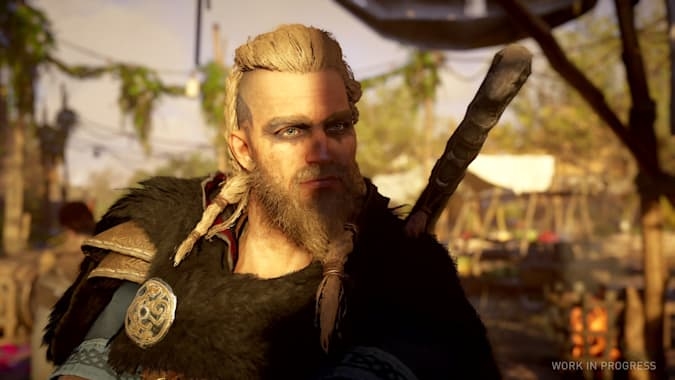
Much of the appeal of the past two Assassin’s Creed games, for me at least, has been in sightseeing; Ubisoft builds beautiful, if somewhat empty, sandboxes that I get lost in, exploring for hours. What little I’ve seen of Valhalla appears to be much the same. I traveled across picturesque landscapes to historical renditions of Norwich, Thetford and Bury St Edmunds, with little to do between settlements but admire the scenery and gather some resources. Sightseeing was tough, given the aforementioned streaming issues, but viewing the local capture afterwards showed a truly stunning world.
Like Odyssey, you can choose between a male or female protagonist, in this case both named Eivor. The demo allowed for switching between protagonists on the fly, and your gender, at least from what I experienced, has no bearing on how characters interact with you, or your ability to romance them. While this, and the many gay encounters I had in ancient Greece, felt natural in the last game, it makes less sense in this time period. It’ll be interesting to see how staunchly Christian Anglo-Saxons, who viewed any casual sex as sinful, deal with my advances. With that said, the intensely awkward silence after an otherwise-chatty Ubisoft rep watched me instigate some gay Viking sex was perhaps the most memorable part of my demo, and as the series has skewed more towards RPG, I appreciate being able to roleplay as I see fit.
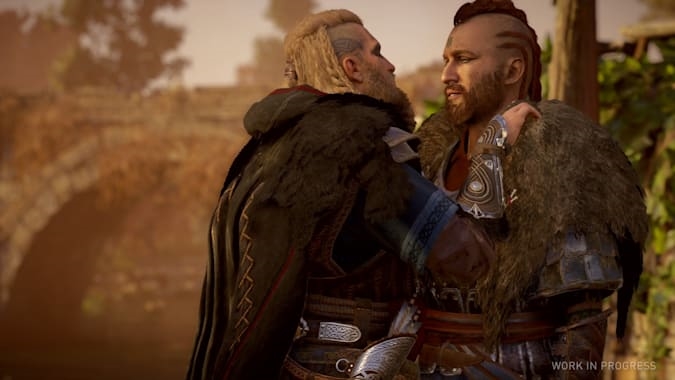
Enough about what’s the same — what’s new in Valhalla? The big-ticket items are assaults and raids. Assaults are roughly analogous to Conquest Battles in Odyssey. I led a small army to attack a fort or castle, which, in the demo, this felt remarkably similar to a round of For Honor: managing crowds, supporting troops and taking down more powerful enemies as I battered my way to climactic one-on-one fight. Raids are a more freeform exercise. You can approach these stealthily, or just rush in with your army from the offset. I took out six or so guards without being detected, and then reached a door that required a second pair of hands to open. I then blew on a horn to summon the raiding party, forced my way in and killed the remaining enemies inside.
Being a Viking, your character is better-suited to all-out combat than past assassins. You have two weapon slots, which can be populated with a combination of items; you could dual-weild small axes, carry a weapon and a shield, or a larger two-handed weapon. There are also three distinct types of bows, all of which handle differently. This leads to a greater variety of options when approaching combat encounters, especially in the context of the assault battles.
Despite the raids and all-out combat elements, there’s more of a focus on stealth than the past two games, which reduced the series’ signature mechanic to hiding in long grass and bushes. You can now put on a cloak, lower your hood and engage in some old-fashioned social stealth to blend into crowds and evade detection. Your feathered companion (a raven in Valhalla) is less powerful than in Odyssey, where you could effectively mark every enemy in an encampment in one pass. You’ll still use your bird to get the lay of the land, and mark up to three targets — another thing nearly impossible in my demo thanks to streaming turning that land into a smudge — but you’ll typically be using your “Odin’s Sight” (the game’s name for eagle vision/animus pulse) to identify enemies to take down individually.
While not shown off in my preview, Settlements, as seen in Black Flag, are back, with a focus on constructing buildings and a community. Another returning feature is the hidden blade for assassinations — in time you’ll apparently be able to kill virtually any target with one stealthy hit. More recent features, like recruiting NPCs, are present. I recruited a cat during my demo, but presumably humans are similarly welcome to join your raiding party. There are also mythic creatures and enemies to fight, in keeping with the shift towards supernatural myth of the past entries. I came up against Black Shuck, a ghostly dog of East Anglian legend, roaming around a ruin in Suffolk.
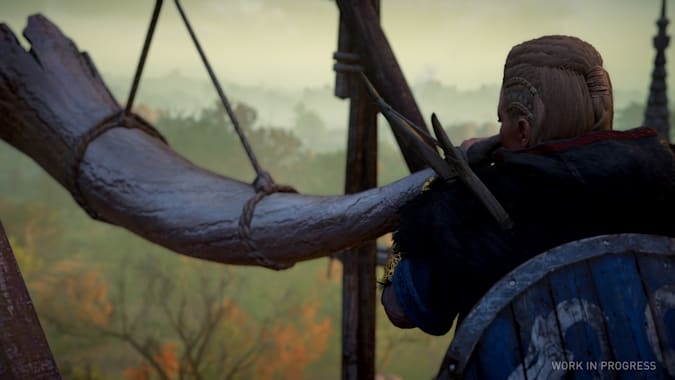
Valhalla, on first impression, is less about “new” than it is about giving old concepts a Medieval lick of paint. For example, the game purportedly puts less of an emphasis on “leveling up,” but it seems more of a palette swap than a wholesale change. You unlock skill points, and put them in one of three categories, Wolf, Bear or Eagle, which align with the hunter, warrior and assassin categories in Odyssey. The points you’ve put in each category are then combined to form your overall power rating, and the map in my demo had a “suggested power” figure overlaid where “recommended level” used to be. So, swapping level gating for power gating.
Some features are more new than others, although you can still trace their lineage. In Odyssey, you could overthrow rulers to shift the balance of the war; in Valhalla, you can forge diplomatic partnerships by facilitating marriages between clans. The demo involved one such marriage, and the reception played host to a number of minigames, including drinking and archery contests. There seem to be plenty of minigames and activities to fill your time with in East Anglia; it’s already been confirmed that you can fish, and in Norwich (or Northwic, as the game calls it) I engaged in flyting, a poetic competition that sits somewhere between a rap battle and Monkey Island’s insult fights.
I’m looking forward to Valhalla, a lot. After the novelty of hearing lots of family members’ names in Odyssey (I am half Greek Cypriot), the choice in location this time around feels like the Assassin’s Creed team is directly targeting its games at me. Having lived in the UK all my life, I can’t wait to explore some of its history, and am already planning a visit to some of East Anglia’s historical sites that featured in my demo. But while I know I’m going to enjoy Valhalla, I still have concerns.
Odyssey was a huge game that demanded 65 hours of my time, when half of that would have sufficed. I’ve heard plenty of arguments that the map was too big — Valhalla’s is seemingly of a similar size, encompassing England and parts of modern-day Norway — but I don’t think that’s it. The map can be as large as Ubisoft likes, so long as there’s variety in what you’re doing.
In my playthrough of Odyssey, the hundreds of sidequests, while well written, mostly involved the exact same gameplay, over and over again. And I spent hours fighting through extremely similar encounters to raise my character to a level where I could progress the story. I’m all for borrowing elements of RPGs to expand a game, but grinding is not a feature that anyone is asking for. For me, the extra activities and fresh twists on old concepts could go a way to making the beautiful world that Ubisoft is crafting feel less shallow, but I hope they’re combined with compelling storytelling, gameplay variety and a runtime that doesn’t outstay its welcome.
Assassin’s Creed Valhalla will be released on November 17th for PlayStation 4, Xbox One, PC and Google Stadia. It’s also coming to PlayStation 5 and Xbox Series X, but whether that’ll be on November 17th isn’t really up to Ubisoft.
https://www.engadget.com/firing its chief creative officerconfirmedrelies heavily on DLCGrand Theft Auto OnlinesourcesAssassin’s Creed
(26)

